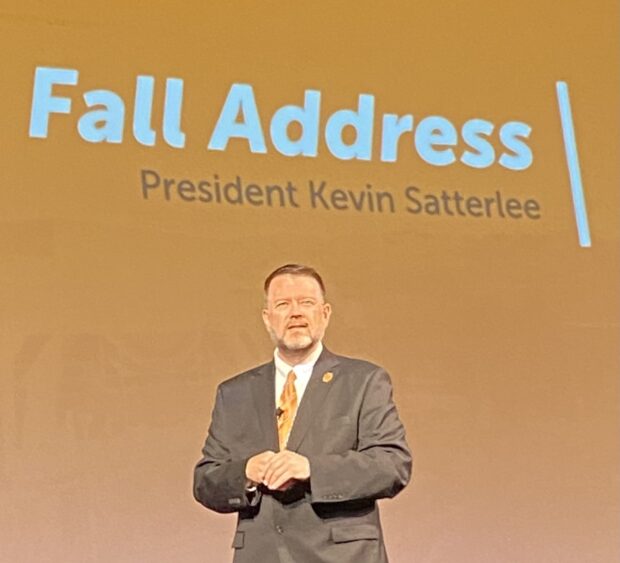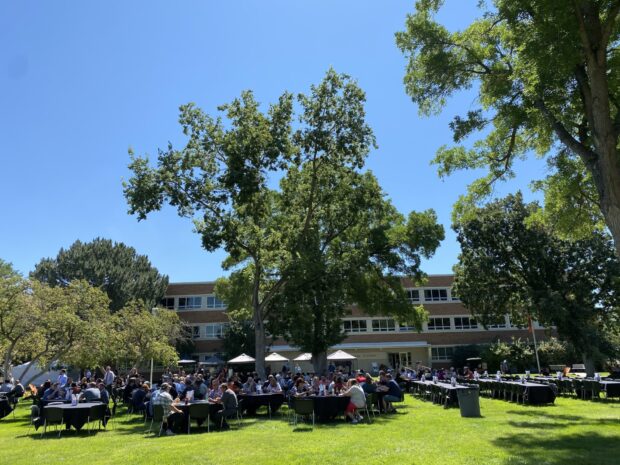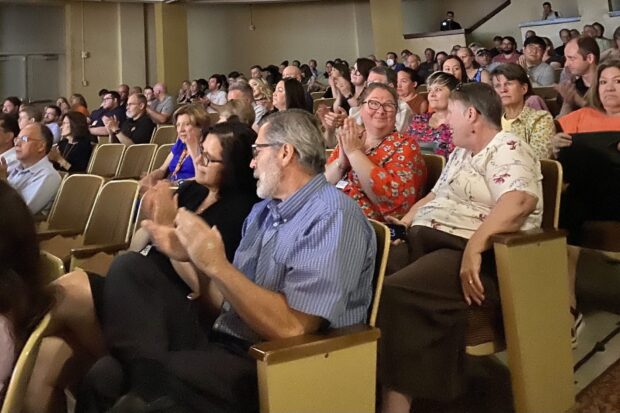Starting today, Idaho State University will be working toward a new goal: carbon neutrality.
This school year, the university will collect data on its carbon footprint, install solar power on its residence hall rooftops, add electric vehicle charging stations on campus, and transition the university fleet to electric vehicles. There will also be a focus on recycling and composting.
President Kevin Satterlee announced the changes in his fall address at Idaho State’s Frazier Hall on Monday morning to the applause of about 800 staffers, faculty, students, and community members who packed the auditorium.
“As of today, Idaho State University starts our journey towards a lower impact on our environment,” Satterlee said. “It won’t be simple or easy. But we’ll be able to achieve it, even though it is hard.”
In his address, Satterlee also characterized education as essential to a stable democracy, and said he will implement an “all-in,” campus-wide challenge that aims to foster nonpartisan civic engagement and civil public discourse.
Satterlee also touted the university’s accomplishments: creating a set of campus-wide values and a board-approved strategic plan; earning reaccreditation last year; improving student retention and achieving greatness during an especially challenging last few years.
Pocatello Mayor Brian Blad attended the speech and said afterward that he was excited about the goals Satterlee described.
“He laid out a number of great opportunities and I have every bit of confidence that we’ll be able to accomplish them,” Blad said. “If the university succeeds, the community succeeds.”

Students sparked the move toward carbon neutrality
Sustainability is “critically important to our students, and to our world. I know this because our students ask me about this more than any other topic,” Satterlee said. “Our students are demanding action and leadership on this issue.”
He wants to be able to tell all incoming students that their residence halls are powered by the sun, and that living on campus has a lower impact on the environment than living off campus.
When students ask where to plug in their electric vehicles, he wants to be able to point to on-campus charging stations – which he says will be installed this fall.
And he wants to be able to measure the university’s carbon footprint. This school year, data will be collected and used to develop “impactful and realistically achievable ways to move forward on a carbon-neutrality goal.”
The news came as a surprise to Kristi Olson, the university’s information technology security director, who was in the audience.
“I’m excited about the sustainability objectives,” she said. “We all want to do our part to lessen our impact.”
Renae Scott, the university’s chief information officer, said she is getting a hybrid car and is looking forward to being able to charge it on campus.

‘Education is at the root of our democracy’
Satterlee said one of the university’s key responsibilities is to “produce an educated citizenry to make our world better.” Thinking critically and analytically, evaluating differing opinions, and engaging in civil discourse are all essential to maintaining a republic.
“Education is at the root of our democracy,” he said.
He shared an anecdote about former President William Howard Taft ordering a military escort and 21-gun salute to honor his predecessor, former President Theodore Roosevelt, when he returned to the United States after two years spent abroad.
“So imagine that for a minute: a sitting U.S. president ordering … (that) for their predecessor .. who had become their rival in the next election,” Satterlee said in a critique of the bitter, partisan acrimony that has characterized American politics of late. “As a nation, as a state, as a community, we can do better than we’re doing now when it comes to political, civil discourse.”
He emphasized that the university does not teach students what to think but how to think and said this year’s focus on engagement and civil discourse would be nonpartisan.
University achievements were especially meaningful after a difficult few years
While listing off Idaho State’s recent accomplishments, Satterlee took time to recognize the toll of the past few years – made especially difficult because of the pandemic – on faculty and staff.
“I need to acknowledge … that this success has come at a cost to everyone,” he said. “I think everyone is a bit tired. Everyone is facing some level of burnout even.” But, he said, “We’re all in this together and will keep fighting for that future we all want.”
He urged faculty to focus on the past year’s highlights:
- Accreditation was reaffirmed last fall, an achievement that took years of effort.
- Academic colleges and departments had their own unique successes – like the College of Arts and Letters facilitating distance learning for rural students; the College of Education providing scholarships for paraprofessionals to become teachers; and the graduate school enrolling its largest ever class last fall.
- A new five-year strategic plan – which included a mission, vision, and values — was approved by the State Board in June.
- A new campus facilities master plan lays out upcoming improvements, such as making a plaza on 9th Avenue and upgrading the Red Hill trail system.
- Idaho State raised $450,000 to pay academic advisers after the Legislature turned down the university’s request for funding. Satterlee openly criticized the legislators’ decision.
- Fall 2021 retention rates were up by about 3 to 7 percentage points in each college (when compared to the previous five-year average).
- The number of students with a first-semester GPA under 2.0 has dropped.
- A mentor program aimed at first-year students is growing and will be provided for this fall’s entire incoming class.
“We are a tiger team that fought through the last few years of adversity,” Satterlee said. “Our graduated students are living proof of why that fight was worth it.”

Afterward, attendees were treated to a free lunch on the quad. Enjoying her lunch, Olson said she appreciated the reminders of all the accomplishments from the past year.
“We get so down in the dirt sometimes that we forget to take a step back and see the whole picture,” she said.

Satterlee’s speech is available to watch in full on the University’s YouTube page.
